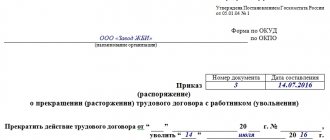Regulatory legal acts upon dismissal due to a change of owner
Consideration of the procedure for dismissing an employee during a change of owner implies a close connection between the labor and civil codes of the Russian Federation, which explain in detail the rights and obligations of both parties.
Article 75.81 of the Labor Code of the Russian Federation presents all categories of employees who are subject to dismissal upon a change of ownership and specifies the time frame for resolving the issue that has arisen. The Civil Code provides for the consideration of disputes between two parties during the procedure.
An important aspect when transferring property into private ownership is the Law “On Privatization dated December 21, 2001 No. 178 FZ. This provision is necessary when considering a possible dispute over ownership.
When resolving labor disputes, it is necessary to submit the Supreme Court Resolution No. 2 of March 17, 2004, which contains all the necessary information on the legality of the procedure in accordance with the law.
Important
Dismissal of an employee upon a change of owner is impossible without a legal basis prescribed in the current legislation of the Russian Federation. If there is no basis, the procedure will be carried out in violation of the law.
Cases of changes in the ownership of an organization
When studying legal acts of legislation, it is impossible to present a clear concept of a change of owner in any organization. At the same time, some provisions explain the procedure for completing the procedure:
- in accordance with the resolution of the Plenum No. 2, paragraph 32 of the Supreme Court, a change of ownership is considered to be the transfer of property rights from one person to another;
- The first article of Law No. 178 FZ implies a change of owner during the privatization of an enterprise and its subsequent transfer to private ownership. In this case, the procedure should be free of charge;
- Art. 235 Civil Code of the Russian Federation and 2 art. 218 of the Civil Code of the Russian Federation considers the process of transferring property from private individuals to the state through transactions for the alienation of property (purchase and sale).
In order to carry out the transfer of property, state registration of property is required in accordance with the norms of the Civil Code of the Russian Federation. Registration of the procedure is possible subject to compliance with the above-described legal provisions prescribed in the current legislation.
A change of owner is considered to be a change in legal entity, the concept of which is clearly defined in Art. 48 Civil Code of the Russian Federation:
- a legal entity is understood as an organization that has separate property, is responsible in court and fulfills all necessary obligations;
- mandatory registration of a legal entity in the unified state register;
- state and municipal institutions are classified as legal entities, since their founders have certain rights to this property;
- Corporate organizations are also legal entities because their members have corporate rights.
For your information
A change in the composition of the founders is not a change in ownership, therefore, in this case, the dismissal procedure is not applicable. It is important to distinguish this concept when making an appropriate decision.
What is reorganization
Reorganization means a change in the legal status of a legal entity due to a change in the number of legal entities that originally existed or a change in their type. During reorganization, one or more legal entities are terminated and (or) another or others appear. The law gave legal entities the right to unite, or join each other, as well as divide into several independent organizations. Reorganization takes place in the forms established by law:
- merger – joining of several organizations into one. In the event of a merger, the workforce of one legal entity is added to another, a new legal entity is formed, and the previous ones cease to exist.
- Spin-off is the formation of independently existing legal entities from one, original one. In this case, the original legal entity continues to function along with the separated one.
- Merger - in this case, one or more legal entities join the activities of another, while ceasing their independent activities. In case of accession, the legal status of the host organization does not change; it only joins the organization to its activities.
- Transformation is a complete change in the legal status of an enterprise. With this form of reorganization, the new legal entity receives the rights and obligations of the previous one in full.
- Division is the termination of the activities of a legal entity, while its rights and obligations are transferred to newly created legal entities.
Reorganization can be voluntary, that is, carried out by decision of the participants of the changing legal entity, or forced, by a court decision.
Categories of employees subject to dismissal
The concept of a change in the owner of an organization does not have direct legal grounds for terminating an employment relationship. The new owner has the right to use Art. 75 of the Labor Code of the Russian Federation and dismissal of workers in such positions:
- head of the enterprise;
- assistant managers;
- Chief Accountant.
Important
The above list of positions subject to dismissal is final, therefore, in case of violation of the law, the injured party has the right to file a claim in court.
In some cases, employers often fire employees who are not listed in the above list, therefore, when the case is considered in court, a positive satisfaction of the claim will be in favor of the dismissed employee (decision No. 33-175-15 of 01/12/2015).
For your information
When there is a change of owner, employees of the relevant enterprise have the right to dismiss at their own request due to changed circumstances (Clause 6, Article 77 of the Labor Code of the Russian Federation). The procedure is carried out according to the usual algorithm by submitting an application to the personnel department.
conclusions
Let us draw several conclusions on the presented topic:
- Based on a change in the owner of the company, at the request of the employer, dismissal of only the manager, his deputy and the chief accountant is allowed.
- An employee has the right to resign on his own initiative, based on a change in the owner of the organization.
- The owner has the right to carry out a reduction procedure, then he is obliged to notify all employees of the upcoming procedure at least 2 months in advance. A report on laid-off employees is sent to the employment center for 3 months.
- Severance pay upon dismissal on personal initiative is not paid.
- The procedure for dismissal at the initiative of the employer and personal desire is an identical procedure. The difference lies in the accompanying documentation.
When an employee cannot be fired under the current circumstances
Dismissal of an employee upon change of ownership cannot be carried out if the employee is currently on sick leave or on vacation.
The current legislation of the Russian Federation provides for cases in which the dismissal of certain categories of employees is prohibited:
- pregnancy in women;
- single mothers with minor children under 14 years of age or with disabilities;
- women with small children under 3 years of age;
- workers raising a child without a mother;
- sole breadwinners in a family with children under 3 years of age;
- the employee has a large family in which he is one employed person.
Registration of the dismissal procedure
Important
Dismissal can be carried out no later than 3 months from the date of change of ownership of the organization’s property.
- The procedure for dismissing an employee when there is a change of owner has a certain algorithm in accordance with the norms of the Labor Code of the Russian Federation:
- issuing a written notice to the employee about the upcoming termination of the employment relationship (not a mandatory item, since the Labor Code of the Russian Federation does not establish the employer’s obligation to notify employees in advance about the termination of the employment contract);
- issuance of a dismissal order, which is signed by the employee and the new head of the enterprise, as well as by an employee of the human resources department;
- full settlement with the dismissed employee and payment of all necessary monetary compensation;
- making an entry in the work book and saving a copy in the archive of the enterprise;
- issuance of a work book and a special journal entry to record the movement of documentation.
For your information
The new owner of the enterprise may, if desired, offer the dismissed employee a transition to a new position, subject to the consent of the employee.
The procedure for terminating labor relations with employees
The procedure for terminating employment contracts may differ depending on the grounds. Let's consider step by step how to fire staff if the procedure for changing the owner of the organization has been carried out.
Dismissal at the initiative of the employer during a change of owner contains several main stages:
- Within three months from the date of receipt of ownership rights, the owner of the company makes a decision on dismissal in the form of an administrative act or minutes of a meeting of the management body. If the employer fails to meet the deadline established by law, it will no longer be possible to calculate the listed personnel on the basis of a change of ownership.
- Delivery of notice of termination of an employment contract. The notification does not have a special form and can be issued in free form, but with mandatory references to the Labor Code of the Russian Federation.
- Filling out the employee’s personal card, created on the day of reception. The employee's due accruals and deductions are made.
- Issuing an order for dismissal, form T-8 . The employee must be familiar with the document before signing.
- Making an entry in the work book. This is done by a personnel employee or other person responsible for storing and maintaining work records. All entries are made in the document on the basis of instructions approved by Resolution No. 69.
- On the last working day, the employee is given a work book and a full payment.
If the new owner decides not to fire management, but the employee himself does not want to stay, he has the right to write a written refusal to continue working. But he will no longer be able to count on severance pay.
Important! When the owner of the company changes, all employees have the right to refuse further work.
The procedure for dismissing personnel due to a change in the owner of the enterprise:
- The employee writes a written refusal to work under the new owner. The law does not establish a deadline for filing an application. Typically, such an application is issued in response to a notice of reorganization, but can be submitted much later. The employee retains the right to withdraw the application until the day of departure (inclusive).
- The employer can offer other positions to the employee, and if he refuses to continue working, the dismissal procedure is initiated.
- An order to terminate the employment contract is drawn up , with which the employee must be familiarized with his signature.
- A full payroll calculation is made, all necessary deductions are made, and the employee’s personal card is filled out.
- An entry is made in the work book.
- On the day of dismissal, the employee receives a paycheck, a work book and the necessary certificates.
In both cases, the employee must receive full payment. It includes wages for actual time worked and compensation for unused vacation.
According to Art. 181 of the Labor Code of the Russian Federation, upon dismissal at the initiative of the organization, the dismissed manager will receive an additional severance pay in the amount of not less than three times the average salary.
If an employee leaves on his own initiative due to a change of ownership, he will not receive severance pay.
After state registration, the new owner has the right to revise the staffing table and reduce staff. But the basis for dismissal here will be somewhat different - “due to staff reduction.”
This is another article of the Labor Code of the Russian Federation; it implies payment of severance pay and payment of the employee’s average earnings for a period of unemployment for up to 3 months.
In such circumstances, the employer must notify staff of the layoff in writing 2 months in advance. Additionally, he notifies the labor exchange about the released people.
What documents need to be completed?
When dismissing personnel due to a change of ownership, the following documentation is drawn up:
- The decision to terminate employment contracts is if the new owner wishes to dismiss the manager, his deputies or the chief accountant.
- Notification of dismissed persons at the initiative of the employer. This document is not legally binding.
- Act of acceptance and transfer of cases. Usually it is drawn up upon the dismissal of persons in management positions for the transfer of: valuables, documents, electronic signatures and keys.
- An application for resignation due to a change of ownership is an actual refusal to work. There is no need to arrange it in advance. The employer will make the payment at the time required by the employee.
An example of a refusal:
To the head of Mak LLC
Mukhina A.A.
from the working SGP
Romashkina A. A.
Statement
Based on Art. 75 of the Labor Code of the Russian Federation I refuse to work in a company due to a change of owner
01/25/2018 Signature Romashkin A. A.
- Order of dismissal one T-8 employee or several T-8 employees a. It is allowed to use other forms of orders if they are approved by the company’s manager. Main points of the document:
Company name; - Title of the document;
- order number and date of issue;
- FULL NAME. position and structural unit of the dismissed person;
- grounds for dismissal and its date;
- attached supporting documents;
- manager's signature;
- employee familiarization visa.
- Closing an employee's personal card. The dismissed person must put his signature in specially designated areas of the document.
- An entry is made in the employee’s work book about the actual dismissal under the relevant article.
- Certificates are issued: 182-N and SZV-STAZH. If an employee needs other certificates or copies of documents, he has the right to make a written request. The employer must issue them within 3 days.
If the employer has already taken ownership and has come to the conclusion to carry out a reduction, the following is issued: an order to reduce staff, a notice of upcoming dismissal for each employee.
Sample book entry
An entry in the work book regarding dismissal based on a change of owner can be of two types:
- “Dismissed due to a change in the owner of the property, clause 4, part 1, art. 81 Labor Code of the Russian Federation."
An example of making an entry in a work book:
- “Dismissed due to refusal to continue working due to a change of owner, clause 6, part 1, art. 77 Labor Code of the Russian Federation."
An example of making an entry:
If the contract is terminated due to staff reduction, the entry must refer to the second paragraph of Art. 81 Labor Code of the Russian Federation. Here reference to a change of owner is no longer made.
Entry in the work book
When an employee is dismissed due to a change of owner, a special entry is made in the work book, which is the basis for the procedure (Resolution of the Ministry of Labor of the Russian Federation No. 69 of March 10, 2013).
After entering the date in the column “employment information”, indicate the following text: “dismissed due to a change of owner, paragraph 4, part one, art. 81 Labor Code of the Russian Federation." The last column indicates the number and date of the order, which is the basis for dismissal.
The completed book is given to the dismissed employee with the company seal affixed, the signature of the HR department employee and the owner of the document. All data is entered into the accounting book, which is subsequently archived and remains at the enterprise.
Sending information about the dismissal of an employee
7.1. Submitting information to the military registration and enlistment office upon dismissal of an employee
The employer is obliged to inform the military registration and enlistment office and (or) local government bodies within two weeks about the dismissal of an employee subject to military registration. Information about the dismissed person is submitted in the form specified in Appendix No. 9 to the Methodological Recommendations for maintaining military records in organizations approved by the General Staff of the Armed Forces of the Russian Federation (paragraph “a”, paragraph 29 of the Recommendations).
For failure to fulfill this obligation, the culprit (the head of the organization or the employee responsible for military registration work) faces a fine of 300 to 1000 rubles. (Part 3 of Article 21.4 of the Code of Administrative Offenses of the Russian Federation).
Payments upon dismissal
The procedure for processing payments in connection with a change of owner is carried out in accordance with Art. 181 Labor Code of the Russian Federation. Upon termination of an employment contract with a manager, chief accountant or deputy. boss, the new owner is obliged to pay benefits in the amount of three months' salary (with the exception of cases provided for by law).
Also, the dismissed employee receives the rest of his salary and compensation for unused vacation.
Art. 279 of the Labor Code of the Russian Federation provides for the mandatory payment of compensation to the manager upon termination of an employment contract. The amount must be at least three times the average monthly salary.
The compensation amount does not include the following charges:
- salary balance;
- saved salary in case of business trip, vocational training or additional education;
- reimbursement of expenses incurred during business trips or moving to another region;
- compensation for all unused vacations;
Important
The manager has the right not to pay benefits if the reason for dismissal is disciplinary action for a number of reasons (violation of the Labor Code of the Russian Federation).
Payments and compensations
If an employee is dismissed by decision of the employer, he has the right to severance pay in accordance with the amount of average monthly earnings.
Moreover, such compensation in the event of dismissal of management personnel on the basis of Art. 181 Federal Law No. 56 of 2014 “On amendments to parts of the Labor Code of the Russian Federation regarding restrictions on severance pay and other payments upon dismissal of individual employees” is paid in three times the employee’s average monthly earnings, except for cases provided for by this Code.
In addition, the employer must pay the earned salary for the last month of work of the manager and accountant, as well as compensation for unpaid vacation days.
Additionally
Also, a dismissed person will be able to receive sick leave if the illness occurred in the first month after payment.
Consequences for the employer
If the rights of a dismissed citizen are violated and labor legislation is not observed, the employee has the right to file a claim to restore the lost position.
If the departmental structure of the enterprise has changed, then this aspect is not grounds for forced dismissal. If desired, the new owner can dismiss workers due to layoffs or for any other reason prescribed in the Labor Code of the Russian Federation.
Violation of norms upon dismissal due to a change of ownership implies liability by the employer in accordance with Art. 5.27 Code of Administrative Offences. The solution to the issue of eliminating the management staff may be alternative proposals for transfer to another position, subject to the consent of the person concerned.
In what cases can an employment contract be changed at the initiative of the employer?
The employer has the right to adjust the terms of the employment contract in connection with organizational or technological changes in working conditions (Part 1 of Article of the Labor Code of the Russian Federation).
Draw up and print an employment contract for free
Organizational changes may include:
- changes in the organization's management structure;
- introduction of forms of labor organization (team, rental, contract, etc.);
- changing work and rest schedules;
- introduction, replacement and revision of labor standards;
- changes in the organizational structure of the enterprise with a redistribution of the load among departments or specific positions, as a result of which the remuneration system has changed.
Technological changes in working conditions may include:
- introduction of new production technologies;
- introduction of new machines, units, mechanisms;
- improvement of workplaces;
- development of new types of products;
- introduction or modification of technical regulations.
It is not allowed to change the terms of the employment contract for other reasons, as well as the actual change in the employee’s labor function.
Is it possible to challenge dismissal?
When considering the question of whether it is possible to challenge dismissal in connection with a change of owner, it should be understood that consideration of the case in court implies the presence of irrefutable evidence that the rights of the dismissed employee were violated during the procedure.
It is best to file a claim directly to the court, since when considering the case, the plaintiff’s costs are minimal, and if the claim is satisfied, it is possible to receive compensation for moral damage caused.
Violation of employee rights occurs in the following cases:
- lack of written form of the concluded employment contract;
- incorrect entry of data into the document;
- termination of a contract with a person who is not included in the category of employees subject to dismissal upon a change of ownership.
If the claim is satisfied, the employee can count on reinstatement and receiving his previous job with the same salary. Corresponding changes are made to the work book and personal card.
If the employee does not agree with the new conditions
The employer is obliged to notify the employee in writing about changes in the terms of the employment contract no later than two months in advance. In this case, a person has the right to refuse to work under changed conditions. In this case, the employee must be offered another job (a vacant position with appropriate qualifications, or a lower-ranking vacant position, or a lower-paid job) that is not contraindicated for him due to health reasons.
Fill out and print out an order using form No. T‑1 for free
If the employer does not have another job or if the employee refuses the offered job, the employment contract is terminated (Part 7 of Article of the Labor Code of the Russian Federation). In this case, the employee’s refusal of the proposed job must be confirmed in writing.









